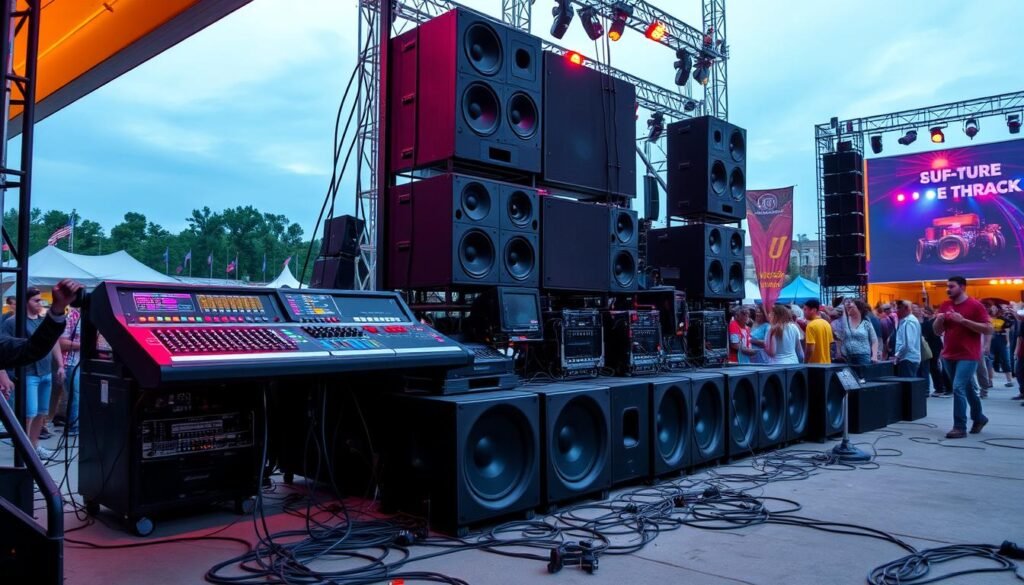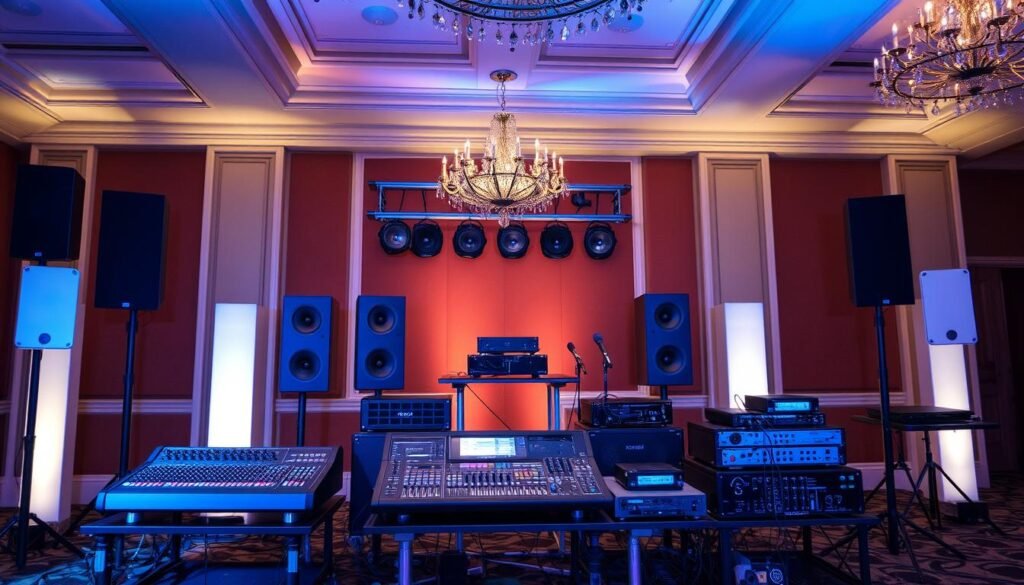ציוד סאונד מקצועי חיוני להצלחת האירועים. צליל איכותי יוצר חוויית צליל אותנטית למשתתפים. זה עשוי להפוך את האירוע שלך לזכור אם זה קונצרט, כנס או חתונה.
מערכות חיזוק צליל מעבירות צליל ברור וחזק לקהל שלך. מערכות PA אלו מבטיחות שכל נאום והופעה נשמעים בבהירות יוצאת דופן. הן מספקות צליל מאוזן המשך את הקהל.
השקעה במערכות הסאונד הטובות ביותר מעידה על המחויבות שלך לאיכות. זה יוצר אווירה מעניינת לקהל שלך. האירוע שלך ישאיר השפעה ארוכת טווח גם לאחר שהוא נגמר.
מסקנות מרכזיות:
- ציוד סאונד מקצועי הוא חיוני להצלחת האירועים
- צליל אירוע איכותי יוצר חוויית צליל אותנטית וזכורה
- מערכות חיזוק צליל מספקות צליל ברור, חזק ומאוזן
- צליל חי מעולה
- הציוד מבטיח בהירות והשפעה יוצאת דופן
- השקעה במערכות סאונד הטובות ביותר מדגישה חיוניות לאירוע מקצועי
הבנת חשיבות הסאונד באירועים
איכות הסאונד חיונית ליצירת אירועים שמשאירים רושם. היא שומרת על מעורבות ומידע של המשתתפים. סאונד רע עשוי לגרום לכעס ולתחושה שלילית.
התפקיד של הסאונד ביצירת חוויית הטמעה
הסאונד יוצר חוויית טמעה שמשך את הקהל. קול ברור מאפשר למשתתפים להעריך את התוכן באופן מלא. ה-בהירות של הסאונד היא חיונית ל-מעורבות הקהל ול-הצלחת האירוע.
סאונד באיכות גבוהה מקיף את הקהל באטמוספירה של האירוע. זה מעביר את המשתתפים לעולם אחר. איכות הקול המעולה עושה את האירועים עוצמתיים ומשאיר רושם.
איך איכות סאונד רעה עשויה להשפיע באופן שלילי על אירוע
איכות סאונד רעה עשויה לפגוע בהצלחת האירוע. קול מטושטש או משונה עשוי להקשות על המשתתפים להבין. זה עשוי לגרום לכעס ולעזיבות מוקדמות.
"איכות הצליל נעלמת לעיתים בתכנון אירועים, אך היא עשויה להגביר או לשבור את חוויית המשתתפים. השקעה במערכת צליל איכותית היא חיונית להצלחת כל אירוע." – שרה ג'ונסון, מומחית בתכנון אירועים
צליל רע משקף על ארגוני האירוע והמרצים. זה מרמז על חוסר מקצועיות. המשתתפים עשויים לראות את האירוע כאירוע שתכנוןו לא טוב.
איכות הצליל השפעה על השתתפות הקהל השפעה על הצלחת האירוע גבוהה ריכוז והשתתפות מוגברים תחושה חיובית וחוויה זכורה נמוכה כעס וחוסר עניין מוניטיה שלילית ועזיבות מוקדמות אפשריות איכות הצליל חיונית ל הצלחת האירוע. העדיפות לאיכות השמע יוצרת חוויות סוחפות. השקעה במערכות צליל אמינות מבטיחה הצלחת האירוע.
רכיבים מרכזיים של מערכות צליל לאירועים
הבנת חלקי המערכת הקולית חיונית לאודיו לאירוע מעולה. כל רכיב מבטיח צליל ברור, חזק ומאוזן בכל אולם. בואו נגלה את הרכיבים החיוניים אלה ואת תפקידם.
רמקולים ומגברים
רמקולים גדולים ממירים אותות חשמליים לגלי צליל נשמעים. הם מגיעים בגדלים וסוגים שונים כדי להתאים לאולמות שונים. מגברי כוח מחזקים את האותות השמע להפעלת הרמקולים בצורה יעילה.
בחירת הרמקולים והמגברים תלויה בגודל האולם וסוג האירוע. גורמים כמו רמות לחץ שמע מבוקשות משחקים גם תפקיד בבחירה.
מיקסרים ומעבדי שמע
מיקסרי שמע הם הלב של מערכות הצליל לאירועים. הם משלבים ומאזנים מקורות שמע מרובים, כגון מיקרופונים וכלי נגינה. מהנדסי שמע משתמשים במיקסרים כדי לשלוט בעוצמת הקול, בפנינג ו-
שיווי משקל לכל ערוץ.
מעבדי אות עובדים עם מיקסרים כדי לשפר את איכות הצליל הכוללת. הם עוזרים להסיר משוב, להפחית רעש ולהחיל אפקטים על ערוצי השמע המסוימים.

מיקרופונים ומערכות אלחוטיות
מיקרופונים תופסים שירה חיה, כלי נגינה ודיבורים באירועים. הם מגיעים בסוגים שונים, כל אחד עם תכונות ייחודיות ושימושים. מערכות מיקרופון אלחוטי מציעות גמישות וחופש תנועה למבצעים.
מערכות אלחוטיות מורכבות ממשדרים שנלבשים על ידי המבצעים ומקלטים המחוברים למיקסר. מיקרופונים באיכות גבוהה ומערכות אלחוטיות אמינות מבטיחים תפיסת צליל ברורה וללא הפרעות.
השקעה ברכיבים ברמת מקצועיות היא קריטית להשגת איכות צליל אופטימלית ואמינות באירועים.
לסיכום, הרכיבים העיקריים של מערכת צליל לאירוע כוללים:
- רמקולים לפלט צליל
- מגברי כוח להובלת הרמקולים
- מיקסרי קול לשילוב ואיזון מקורות קול
- מעבדי אות לאופטימיזציה ושיפור הצליל
- מיקרופונים ללכידת צליל
- מערכות אלחוטיות לגמישות וניידות
רכיב פונקציה רמקולים ממירים אותות חשמליים לגלי צליל נשמעים מגברי כח מגבירים אותות שמע כדי להניע רמקולים בצורה יעילה מיקסרי שמע משלבים ומאיזים מקורות שמע מרובים מעבדי אות מגבירים ומשפרים את איכות הצליל מיקרופונים לוכדים שירה חיה, כלי נגינה ונאומים חיים מערכות אלחוטיות מספקות גמישות וחופש תנועה לביצועים לדעת את תפקיד כל רכיב עוזר למארגני אירועים לקבל החלטות חכמות. הם יכולים לבחור ולהגדיר מערכות צליל העונות על צרכי האירוע שלהם. זה מבטיח חוויית שמע מוקפת ונעימה עבור הקהל.
גורמים לשיקול על בחירת מערכת צליל לאירוע
בחירת המערכת הצליל הנכונה עבור האירוע שלך חיונית. זה משפיע על חוויית השמע הכוללת ועל שביעות רצון הקהל. שיקול זה מבטיח אווירה מוקפת ומרתקת עבור כל הנוכחים.
גודל המקום ואקוסטיקה
גודל המקום והאקוסטיקה משפיעים באופן משמעותי על בחירת מערכת הצליל. מרחבים גדולים דורשים רמקולים חזקים להפצת צליל אחידה. מקומות קטנים עם אקוסטיקה טובה עשויים לעבוד עם התקנות קומפקטיות.
ערכו את מאפיי האקוסטיקה של המקום בזהירות. שקלו חומרים שקוטפים צליל כמו שטיחים ווילונות. כן תשימו לב למשטחים מראים כמו זכוכית ובטון.

סוג האירוע וסוג המוזיקה
סוג האירוע וסוג המוזיקה משפיעים על דרישות מערכת הצליל. ללהקות חיות נדרשים התקנות נרחבות עם מספר מיקרופונים ומוניטורים. הצגות תדמיתיות עשויות לדרוש רק מערכות PA בסיסיות.
חשוב לשקול את ציפיות הקהל בעת בחירת הציוד. סוגי המוזיקה השונים דורשים צרכים שונים בתחום השמע. לדוגמה, מוזיקת ריקודים אלקטרונית דורשת תגובת באס חזקה.
תקציב ואפשרויות השכרה
התקציב השמע שלך חשוב בעת בחירת מערכת צליל לאירוע. עליך למצוא איזון בין איכות לפתרונות כלכליים המתאימים לצרכים המסוימים שלך. השכרת ציוד היא אפשרות פופולרית.
שירותי השכרת ציוד שמע מציעים גישה לציוד מקצועי. אפשרות זו מתרחקת מהשקעות גדולות מראש. רבות מהחברות מספקות חבילות בהתאמה אישית המותאמות לאירוע שלך.
סוג האירוע מערכת סאונד מומלצת עלות השכירות המשוערת כנס קטן (50-100 משתתפים) מערכת PA בסיסית עם 2-4 רמקולים ו-1-2 מיקרופונים אלחוטיים $200-$500 פסטיבל מוזיקה חייה (1,000+ משתתפים) מערכת רמקולים מורכבת עם סאבוופרים, מוניטורים לבמה ומיקרופונים מרובים $2,000-$10,000+ קבלת חתונה (100-200 אורחים) מערכת PA בגודל בינוני עם 4-6 רמקולים, מיקסר ו-מיקרופונים אלחוטיים $500-$1,500 שקול את אקוסטיקת האולם, דרישות האירוע, והתקציב שלך בעת בחירת מערכת צליל. דאג לאיכות הצליל ועבוד עם מקצוענים מנוסים. הגישה הזו מבטיחה חוויית שמע מוצלחת ומעוררת התענוג.
הכנת ואופטימיזציה של מערכת הצליל לאירוע שלך
הגדרת מערכת הצליל בצורה נכונה חיונית לחוויית השמע הטובה ביותר באירוע שלך. פלוס רמקולים באופן אסטרטגי בכל רחבי האולם לכיסוי צליל אחיד. פרסם אותם בגבהים וזוויות מתאימים, על פי גודל ופריסת האולם.
הימנע ממחסומים שעשויים להפריע להקרנת הצליל. לאולמות גדולים, השתמש ברמקולי השהייה כדי לשמור על סנכרון שמע. בצע בדיקת צליל מקיפה לפני האירוע כדי לזהות ולטפל בכל בעיה.
כוון רמות השמע עבור כל מיקרופון, כלי נגינה, ומקור שמע. וודא מיקס מאוזן והסר פידבק, אי סטורט, ונקודות מתים. תקשורת עם הטכנאי הקול, מארגני האירוע, והבמאים כדי לכוון את הצליל.
השוויון במערכת הצליל הוא מרכזי לאיכות צליל מיטבית. יש להשתמש במשוואת שווי גרפית כדי לאזן תדרים ולשפר טונים רצויים. יש להחיל שוויון בהתאם לסוג המוזיקה, ליכולות הרמקולים ולאקוסטיקה של האולם.
יש לעקוב ולהתאים את הגדרי ה- EQ במהלך האירוע כדי לשמור על איכות צליל עקבית. שוויון נכון יוצר חוויית שמיעה מקורית ומוצקת למשתתפים.
שאלות נפוצות
אילו סוגי אירועים דורשים ציוד צליל מקצועי?
ציוד צליל מקצועי הוא חיוני לסוגי אירועים שונים. קונצרטים, כנסים, חתונות ואירועי חברה כולם זקוקים לשמע באיכות גבוהה. זה עוזר לעורר את תשומת לב הקהל וליצור חוויות מוקפות.כיצד איכות צליל רעה משפיעה על אירוע?
איכות צליל רעה יכולה לשחק תפקיד בכישלון של אירוע. היא מביאה לאי-שביעות רצון של הקהל ולהפחתת ההשתתפות. צליל בלתי ברור ומוצקק עשוי להקשות על המשתתפים ליהנות מהתוכן.מהם הרכיבים העיקריים של מערכת צליל לאירועים?
רמקולים, מגברים, מיקסרים ומעבדי קול הם חלקים בלתי נפרדים של מערכות צליל לאירועים. מיקרופונים ומערכות אלחוטיות משמשים גם הם תפקידים חיוניים. רכיבים אלה עובדים ביחד כדי לספק צליל ברור וחזק לקהל.הרמקולים מקרינים צליל בצורה יעילה, בעוד שהמגברים מחזקים את האות. המיקסרים ומעבדי הקול מנהלים ומשפרים את האותות השמע. המיקרופונים והמערכות האלחוטיות מאפשרים לכם לכידת צליל גמישה והעברתו.אילו גורמים צריך לשקול בעת בחירת מערכת צליל לאירוע?
שקלו את גודל האולם והאקוסטיקה בעת בחירת מערכת צליל. סוג האירוע וסוג המוזיקה גם משפיעים על בחירת הציוד. קחו בחשבון את התקציב שלכם וחקרו אפשרויות השכירה לפתרונות כלכליים.איך אני יכול להבטיח איכות צליל אופטימלית במהלך האירוע שלי?
התייחסו למיקום הרמקולים לצורך מיקום מתאיםכיסוי צליל. ערכו בדיקת צליל מקיפה לפני האירוע. כוונו את הרמות והשווו את המערכת עבור צליל בילוד, ברור.העבודה יחד עם מקצוענים בתחום הצליל יכולה לעזור למקסם את מערכת הצליל של האירוע שלך. הם יכולים להגדיר ולכוון את הציוד עבור התוצאות הטובות ביותר.האם זה נחוץ להשקיע בציוד צליל מתקדם עבור אירועים קטנים?
ציוד צליל באיכות גבוהה חשוב גם לאירועים קטנים. ציוד צליל אמין מבטיח מסירת צליל ברור ומשפר השתתפות הקהל. ציוד שמתוחזק היטב משאיר השפעה חיובית על המשתתפים, ללא קשר לגודל האירוע.



